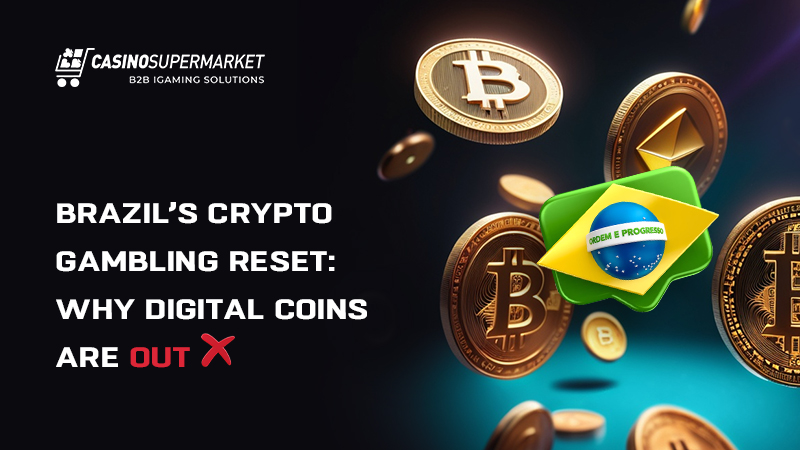
Brazil has moved from permissive workarounds to a clear, fiat-only regime for online gambling. Crypto deposits and withdrawals that once funnelled the play to offshore sites are no longer permitted. The conversation for operators and players has shifted from «whether» crypto belongs to «how» a traditional payments stack refashions product design, onboarding, and compliance.

The new strategy for Brazil is a structured jurisdiction that favours transparency and predictable recourse over anonymity and speed. The Casino Market reveals the process of shifting with all its legal intricacies and directs operators and investors towards a lucrative path for the gambling business in the country.
Order a turnkey or a White Label project with all the necessary and legal payment gateways to function in Brazil.
What the Rule Says Now
Under Normative Ordinance No. 615, licensed operators must not accept cryptocurrency. The rule took effect on 1 January 2025 in parallel with the official launch of Brazil’s legal iGaming framework, and it limits cashier options to electronic transfers. The regulatory intent requires auditable flows, consistent oversight, and outcomes that can be evidenced during financial checks and formal audits. In operational terms, that means bank-friendly reconciliation, standard documentation, and clean data trails.
Regulators did not set out to punish new technology. They targeted opacity. A national market at scale requires tools that supervisors and banking partners can follow in real time. Removing cryptocurrency from the licensed cashier streamlines monitoring, enhances consumer protection, and reduces leakage to unlicensed environments, where complaints are more difficult to resolve and funds are harder to trace in a timely manner.
- oversight of money flows that is verifiable end-to-end;
- simpler cooperation with banks and payment providers;
- lower exposure to the black market and unlicensed platforms;
- stronger AML/KYC anchored in uniform documentation;
- clearer dispute resolution and refund pathways.
How Crypto Filled the Gap Prior to Regulation

Before the current framework, Brazil’s high digital penetration met an absence of fully defined iGaming rules. Peer-to-peer crypto transfers offered an easy route to offshore casinos, especially for users who preferred to bypass local verification procedures.
From the initial sports betting law in 2018 to the passage of Law No. 14,790/2023 in December 2023, crypto-based casinos found a niche. Onboarding felt quick, friction was low, and the «borderless» story was compelling. The new system has rewired those incentives after it made fiat rails the only legal option.
At the same time, market analysis indicates that crypto represents just a small fraction of Brazilian gambling activity. Only about 0.7% of transactions travelled through digital-asset rails. The narrative of dominance is therefore overstated. In policy terms, rules are written for the mainstream, not the marginal use case.
Enforcement in Practice and the Channelisation Challenge
Brazil’s approach is based on monitoring and alignment between payments and licensing. The Central Bank now screens crypto exchange activity to flag suspicious flows connected to unlicensed platforms. This closes the loop between cashier behaviour and regulatory objectives. This is designed to steer funds into supervised corridors and keep them there.
At the same time, licensed operators are betting on localisation and stronger KYC to build trust. Smooth onboarding, clear cashier messaging, and predictable withdrawals are now the recipe for streamlined and trusted operation. The risk remains that a subset of users may test offshore options again. Managing that tension is the shared task of regulators and compliant brands.
Here is a focused plan that supports both compliance and growth:
- Rebuild the cashier from the ground up. Make approved electronic transfers the default and strip every crypto reference from product flows, help pages, emails, and affiliate materials.
- Put identity and record-keeping first. Layer KYC proportionally to risk, keep complete evidence trails for onboarding and payouts, and store everything in an audit-ready repository.
- Localise economics, not anonymity. Set deposit ranges, withdrawal SLAs, and incentive logic around local banking habits, and reward verified users with transparency perks rather than stealth benefits.
- Explain the «why» at every touchpoint. Publish a clear payments FAQ, add in-journey tooltips, and send service messages that frame bank rails as faster to resolve disputes and safer for refunds.
- Monitor what matters. Build rules and models tuned to Brazil-specific behaviours, escalate edge cases to manual review, and document decisions so that investigators can retrace them.
- Harden your vendor and data chain. Collect attestations from payment partners, standardise log formats, and keep a single source of truth for transactions, consents, and KYC artefacts.
- Rehearse the audit. Run quarterly mock inspections, maintain continuity plans for payment outages, and keep policy documents version-controlled, so the latest standard is always provable.
The checkout journey becomes clearer, but also more structured. Users will not see anonymous crypto options, and verification will be stronger at onboarding and payout. Refunds will follow bank-recognised processes, and disputes will decrease as documentation improves. Overall, if channelled correctly, exposure to unlicensed destinations will be reduced.
Reasons to Ban Today
The near-term objective is to have tighter control over money flows and a reduced scope for illegal betting. Experts note that, even though crypto is technically traceable, it offers less regulatory control than fiat rails within a mass-market compliance model. Brazil has concluded that traditional payments answer today’s needs.
This does not automatically set a worldwide precedent. Estimates put the global crypto-gambling segment at roughly $3.5 billion based on observed transactions, far below broad market figures cited for fiat (almost $82 billion). Brazil’s stance reflects national priorities to structure the market, protect consumers, and disrupt illegal supply lines. Other jurisdictions may choose different balances, but Brazil’s direction is unambiguous.
The Main Things about the Country’s Crypto Gambling
Brazil has moved from a destination that supported digital funds as a grey area to a supervised, fiat-only marketplace. The new settlement prioritises transparent flows, credible compliance, and user trust.
Key nuances to consider about the change:
- From 1 January 2025, Normative Ordinance No. 615 prohibits crypto payments and limits licensed operators to electronic transfers.
- The policy focuses on auditable transactions, banking alignment, and stronger AML/KYC.
- Despite visibility, crypto handled roughly 0.7% of gambling transactions in Brazil.
- Monitoring by financial authorities and localisation by licensed brands aim to keep the play in regulated channels.
- Some users may still opt for offshore options, so communication, UX, and withdrawal predictability are crucial.
If you plan to serve Brazilian users, position fiat rails as a reliability feature, not a downgrade. Casino Market will help you turn compliance into a competitive advantage. Order a turnkey gambling project with a Latin American focus. Purchase all the necessary software for your existing Brazilian or any other culture-oriented platform.
Have questions or want to order services?
Contact our consultants:
- e-mail: manager@casino-market.com
- feedback form.
Check the information used to contact us carefully. It is necessary for your safety.
Fraudsters can use contacts that look like ours to scam customers. Therefore, we ask you to enter only the addresses that are indicated on our official website.
Be careful! Our team is not responsible for the activities of persons using similar contact details.








